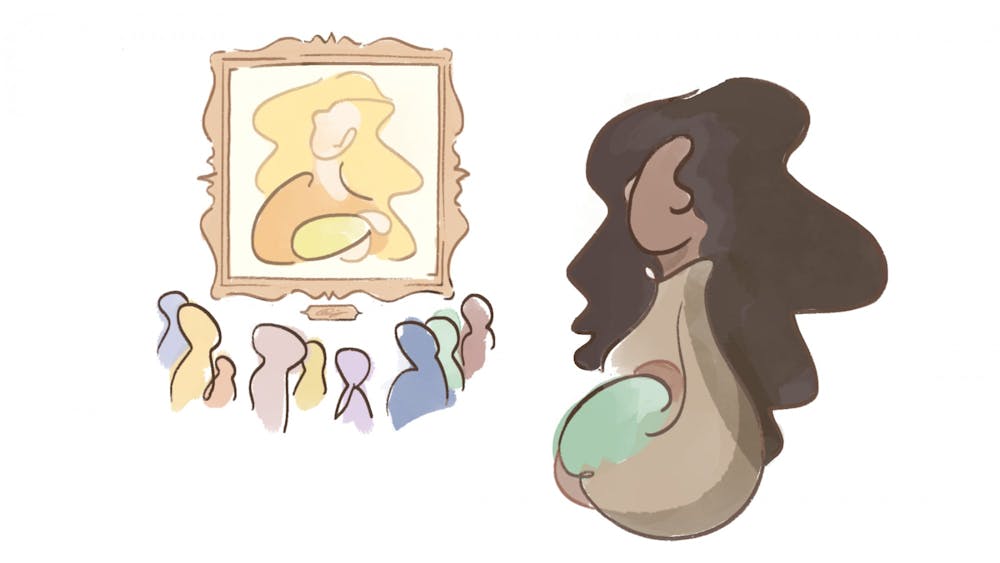“Baby mama,” a term used to describe the mother of a child whose father she is not with, was popularized through African American Vernacular English. But throughout recent years, the designation of “baby mama” has become more common in the general American lexicon, making its way into music and movies.
The term has some negative connotations—namely that the “mama” in question only has a purely sexual relationship with the baby’s father and that she is not the chosen partner of the man she shares a child with. Though it has been recontextualized with a more positive bent in recent years, “baby mama” continues to be considered a dismissive or even offensive label, especially for Black women.
Baby mama is a controversial term due to the fact that it plays with two all–too–familiar anti–Black stereotypes: the absent father and the welfare queen. Through the absent father stereotype, Black men are deemed too irresponsible or criminal to remain with their families, leaving behind their baby mamas to raise their kids. Despite the fact that 72% of Black children are born to unmarried mothers, another statistic is frequently ignored—the majority of Black men do remain with their children.
The welfare queen label is pushed onto Black single mothers and demonizes them for asking for government assistance. This generalization goes back to the 1960s, when politicians sought to portray those in poverty as freeloaders. Combined with the stereotype of Black female promiscuity, Black “welfare queens” are painted as women who irresponsibly get pregnant in order to gain more money from the state or do so to get rich off of the father’s child support.
The myths of the welfare queen and the absent father intersect to tell a disparaging story about Black single motherhood—or baby mamas. Despite increased usage of the term, it is still heavily associated with Black women.
Professor Dr. Maia Hoskin, who is married, recalled a moment in her office when she was flippantly called a “baby mama” by one of her white colleagues in a MadameNoire article. A 2008 Fox News segment referred to Michelle Obama as “Obama’s baby mama.” Twitter user @indiaroyaletv says it best: “Y’all notice when people talk about Black women, we’re always the 'baby mama.' But when they talk about other races, it’s 'girlfriend' or 'ex'?”
Kylie Jenner—a member of the Kardashian clan of reality TV stars and beauty mogul—welcomed her second child with Travis Scott last month. Both Kylie and her older sister Khloe Kardashian fit the definition of a baby mama—neither of them are in a current relationship with the father of their child. Yet they have escaped the negative notions attributed to being an unmarried mother.
All it took was for Kylie Jenner to wear a “baby mama” necklace to Coachella for her to be praised by Bustle for “reclaiming” the title. A planned W magazine cover story featuring Kylie and Travis (that was scrapped due to the Astroworld Tragedy) described how their unmarried status is a powerful example of a “family operating on their own terms.”
It could be argued that the visibility and praise of Kylie's single motherhood is a win for all baby mamas, but the reality is that this newfound love for the baby mama lifestyle still leaves Black women behind. Kylie is a wealthy white woman who can afford to give her children everything they need, as well as afford full–time help. Her version of single motherhood is glamorous because of her wealth—not because her and Travis have mastered the art of co–parenting.
Kylie’s whiteness also allows her to bypass any of the racial implications the baby mama label has. For Kylie, being a baby mama is just another aspect of her trendy or unconventional lifestyle. But for Black women, being seen as a baby mama comes with a long history of racist and classist assumptions about single motherhood.
The disparity in how white and Black baby mamas are perceived is yet another example of the way white women get to benefit from the same stereotypes that demean Black women. Kylie may be able to reclaim the baby mama label with pride, but ultimately, it’s her privilege that allows her to do so.

